Effective Home Remedies for Lice Removal
By Dr Rajeev Singh +2 more

Get,

to manage your symptom
Get your,


4 Cr+ families
benefitted

OTP sent to 9988776655



You’ve successfully subscribed to receive
doctor-approved tips on
Whatsapp

Get ready to feel your best.

Hi There,
Download the PharmEasy App now!!


Register to Avail the Offer
Send OTPBy continuing, you agree with our Privacy Policy and Terms and Conditions

Hi There,
Sign up on PharmEasy now!!
Trusted by 4 crore+ families

OTP sent to 9988776655



You have unlocked 25% off on medicines




Code: NU25
By Dr Rajeev Singh +2 more
Table of Contents
Behind every school-going child with an itchy head is a very worried parent, dreading that the child might have lice. Head lice are prevalent in school-going children. It can affect anyone. Head lice are small insects that crawl into the hair and make it their home. They then suck up blood from the head and lay eggs known as nits. These stick to hair shafts so tightly that it becomes tough to pull them out. When there is an infestation of lice in the head, it is known as pediculosis. There are many ways that we can get rid of these little insects1. Let’s explore more about lice and how you can manage them at home.
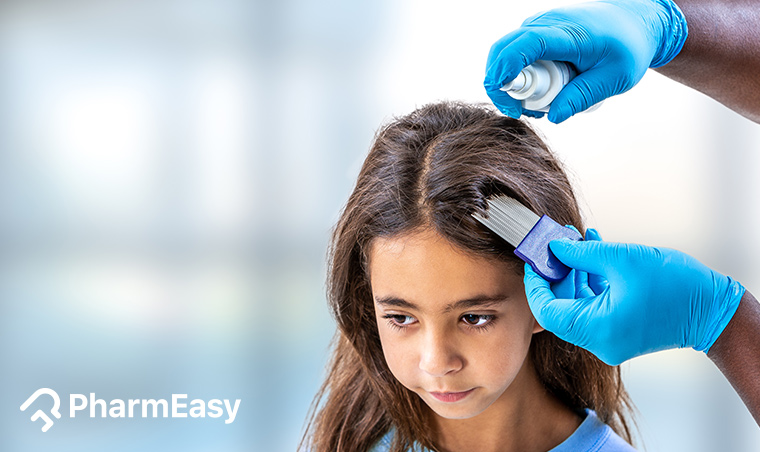
You can get infested by lice, also known as Pediculus humanus capitis, in the hair of your head when you come in close head-to-head contact with anyone who has head lice. You can even get it by sharing objects such as combs, hats, caps and hairbrushes with a person infested with head lice. You can see them as tiny nits attached to your hair. They might look like dandruff, but unlike dandruff, they cannot be shaken up or brushed off1.
Lice are more common in females than males and more frequently seen in Caucasians than African-Americans1. Some of the symptoms that might help you to recognise head lice infestation are:
Head lice are a common problem that any of us can face. Unfortunately, most of these remedies do not have enough scientific evidence to back them. Nevertheless, they are being used by people. Here are a few home remedies that you may find beneficial for managing head lice infestation.
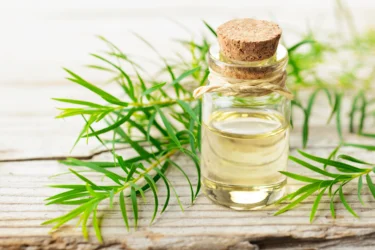
Tea tree oil possesses various beneficial properties, including the activity against various microbes. It can effectively destroy bacteria, viruses and fungi. It also has the property of eliminating insects. Tests were done in the laboratory to see if tea tree oil was effective against head lice. It was found that tea tree oil was indeed effective and resulted in the destruction of lice and their eggs2. You can make use of tea tree oil by taking a few drops of it and applying it to your scalp.
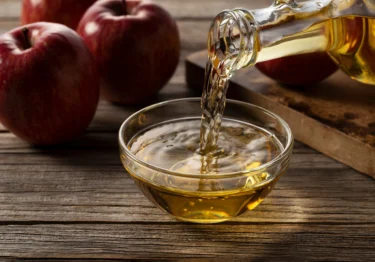
There is very little scientific evidence supporting the use of vinegar as a remedy for head lice. Though it is commonly recommended by people and has been used for a long time for this purpose, it was found to be less effective in destroying lice and stopping their eggs from hatching when compared to other home remedies3. Nevertheless, you can try this remedy, as some people found it to be effective. You can use a few drops of vinegar to apply to your scalp and leave it in for a few minutes. After that, make sure that you wash your hair thoroughly.
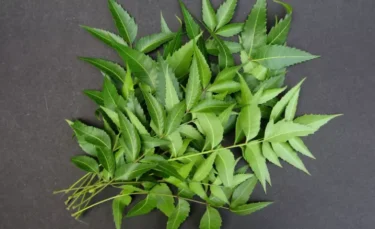
It is claimed that neem is effective in killing head lice. Neem is a part of many shampoos and oils that claim to be effective against head lice. Neem is effective against many insects, but the exact way in which it acts on lice is still not known4. You can use it as a remedy for lice by simply making a juice of neem leaves and applying it onto your head, leaving it for 10-15 minutes and washing it. You can also use neem leaves in the form of a thick paste or boil them in oil and apply to your scalp.
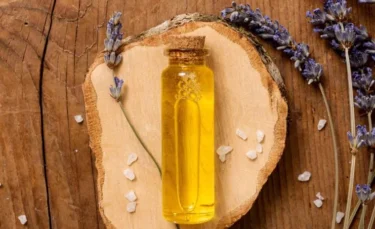
Essential oils are found to be effective in the elimination of head lice. A clinical trial5 showed that lavender oil, when mixed with tea tree oil, was effective in killing head lice. The exact mechanism of action is not known, but essential oils, especially lavender oil and tea tree oil mixture, were found to have more than 97% efficiency in the termination of head lice. You can make use of this by simply mixing the two oils and applying them to your scalp. It can be kept overnight or washed away after a few hours.
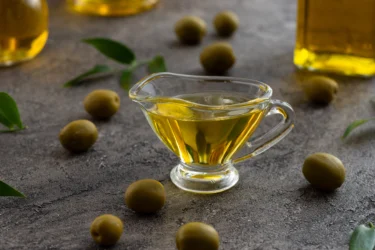
Various unconventional management options are used for head lice infestation, and oil-based remedies are one among them. The given explanation for the use of olive oil as a remedy is that it prevents movement (immobilisation) and suffocates the lice in the head. However, there is no scientific evidence to back this information, yet it is being used6. You can also use this remedy. It is a straightforward home remedy in which you just have to apply olive oil on your head and leave it overnight.
Also Read: How to Clear a Stuffy Nose with Home Remedies
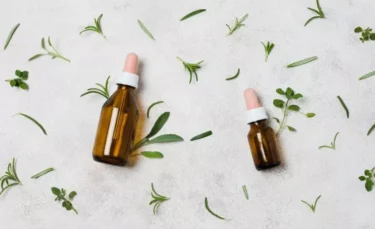
In studies7, it was found that eucalyptus oil was effective in eliminating head lice and their eggs. It was also found to be safe for use and caused only mild itching in a few people. In the same study7, eucalyptus oil was compared to another product and was found to be more effective in killing head lice. Therefore, it might be used as a remedy for head lice infestation. You can take a few drops of eucalyptus oil and apply them to your scalp. You can also mix it with other oils and use it.
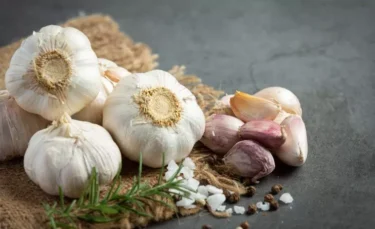
In Ayurveda, garlic is used in the management of head lice8. You can utilise this remedy as well. You can take a few cloves of garlic and make them into a paste. You have to add a little bit of lemon juice to this paste. Mix it well and apply this mixture to the roots of your hair. Leave it for one to two hours, and then rinse it properly with water. To reap the benefits of this remedy, you have to use it diligently.
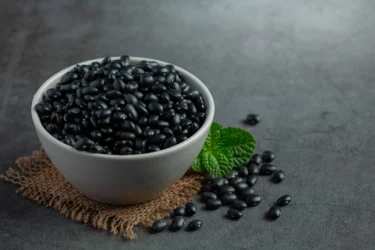
Masha is also a remedy that is used in Ayurveda. It is also known as Jangli Urad in Punjabi and Mashvan or Mashoni in Hindi. To use Masha as a remedy for head lice, you have to cook these seeds in a little bit of sesame oil. Cook these seeds on low flame for a few minutes. Apply this oil to your head regularly for some time to see its beneficial effects for managing head lice.
Onion oil, which has the antibacterial and antifungal properties of onion, is helpful in removing lice eggs from the hair. Besides, it nourishes the hair and also aids in growth, so using it is even better.
Dr. M.G. Kartheeka, MBBS, MD (Pediatrics)
Also Read: 7 Powerful Home Remedies for Acne!
If you cannot get rid of the lice even after using home remedies, you should visit a doctor who might prescribe medicated shampoos or oils. However, if the problem persists even after using prescribed oils or shampoos, you should revisit your doctor and inform them about the severity1. You should seek immediate medical advice if you see any signs of infection, such as:
Head lice do not die on their own if left untreated. If you let it stay untreated, it might complicate and lead to more severe itching and discomfort as the lice multiply rapidly without treatment.
Dr Ashish Bajaj, M.B.B.S, M.D. in Clinical Pharmacology and Toxicology
Itching in your head may be due to a lice infestation. Head lice can infest anybody, and it is more common in school-going children, as they are more likely to share combs, hats, etc., and come in head-to-head contact with others. There are a few home remedies, such as lavender oil, eucalyptus oil and others that you can use to get rid of this infestation. You should seek medical advice if head lice persist even after using home remedies. Your doctor might prescribe medicated shampoos or oils for use.
Also Read: Natural Home Remedies for Leg Pain
Yes, anyone can get head lice if they come in head-to-head contact with a head lice-infested individual or share objects such as hairbrushes and hats with them.
No, lice are tiny crawling insects that can infest your head hair. They can stay in your head, suck blood and lay eggs in your hair. The insect’s name is lice (also known as Pediculus humanus capitis).2 It is not a viral infection.
Yes, men can get infested by head lice just like anybody else. However, it is more common in women than in men.
There is a possibility that the specks that look like dandruff but do not go away on brushing or shaking are known as nits. Nits are the eggs of head lice. To be sure, kindly consult your doctor.
Yes, neem is used as a home remedy for head lice. The exact way in which it acts is not known. It is also an ingredient of various shampoos and oils that claim to be effective against head lice.
1. Centers for Disease Control and Prevention. About head lice [Internet]. Atlanta: CDC; 2024 Jun 4 [cited 2025 May 22]. Available from: https://www.cdc.gov/lice/about/head-lice.html
2. Di Campli E, Di Bartolomeo S, Pizzi PD, Di Giulio M, Grande R, Nostro A, et al. Activity of tea tree oil and nerolidol alone or in combination against Pediculus capitis (head lice) and its eggs. Parasitol Res [Internet]. 2012 July 31 [cited 2022 May 24];111(5):1985-92. Available from: https://www.ncbi.nlm.nih.gov/pmc/articles/PMC3480584/pdf/436_2012_Article_3045.pdf
3. Johnston CS, Gaas CA. Vinegar: Medicinal Uses and Antiglycemic Effect. MedGenMed [Internet]. 2006 May 30 [cited 2022 May 24];8(2):61. Available from: https://www.ncbi.nlm.nih.gov/pmc/articles/PMC1785201/
4. Brown CM, Burgess IF. Can neem oil help eliminate lice? Randomised controlled trial with and without louse combing. Adv Pediatr Res [Internet]. 2017 June 30 [cited 2022 May 24];4:9. Available from: https://www.researchgate.net/publication/318347702_Can_neem_oil_help_eliminate_lice_Randomised_controlled_trial_with_and_without_louse_combing
5. Barker SC, Altman PM. A randomised, assessor blind, parallel group comparative efficacy trial of three products for the treatment of head lice in children–melaleuca oil and lavender oil, pyrethrins and piperonyl butoxide, and a “suffocation” product. BMC Dermatol. 2010 Aug 20;10:6. doi: 10.1186/1471-5945-10-6. PMID: 20727129; PMCID: PMC2933647. Available from: https://pubmed.ncbi.nlm.nih.gov/20727129/
6. Mazurek CM, Lee NP. How to manage head lice. West J Med [Internet]. 2000 May 1 [cited 2022 May 24];172(5):344-5. Available from: https://www.ncbi.nlm.nih.gov/pmc/articles/PMC1070891/pdf/wjm17200342.pdf
7. Greive KA, Barnes TM. The efficacy of Australian essential oils for the treatment of head lice infestation in children: A randomised controlled trial. Australas J Dermatol [Internet]. 2018 Dec 30 [cited 2022 May 24];59(2):e99-105. Available from: https://www.ncbi.nlm.nih.gov/pmc/articles/PMC6001441/pdf/AJD-59-e99.pdf
8. Samiasih A, Dianingsih A, Ferdisa RJ, Wati F, Hartiti T, Ernawati E, Yanto A. The effectiveness of garlic, black turmeric, and red betel vine solutions to maintain scalp hygiene (pediculicide efficacy test toward head lice). South East Asia Nursing Research. 2020 Dec 30;2(4):132–138. doi: 10.26714/seanr.2.4.2020.1-7. Available from: https://www.researchgate.net/publication/348090555_The_effectiveness_of_garlic_black_turmeric_and_red_betel_vine_solutions_to_maintain_scalp_hygiene_pediculicide_efficacy_test_toward_head_lice
Disclaimer: The information provided here is for educational/awareness purposes only and is not intended to be a substitute for medical treatment by a healthcare professional and should not be relied upon to diagnose or treat any medical condition. The reader should consult a registered medical practitioner to determine the appropriateness of the information and before consuming any medication. PharmEasy does not provide any guarantee or warranty (express or implied) regarding the accuracy, adequacy, completeness, legality, reliability or usefulness of the information; and disclaims any liability arising thereof.
Comments

Leave your comment...
You may also like
Comments